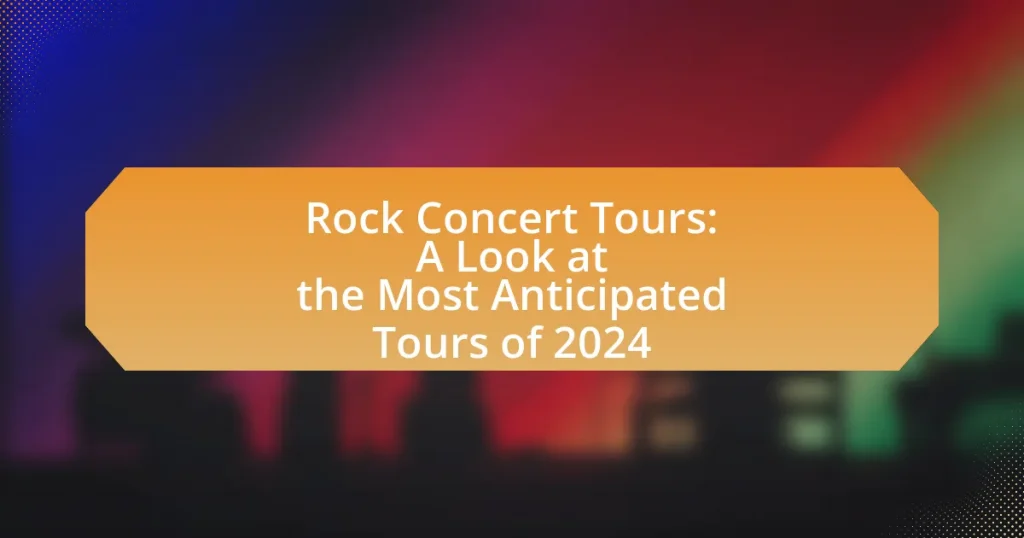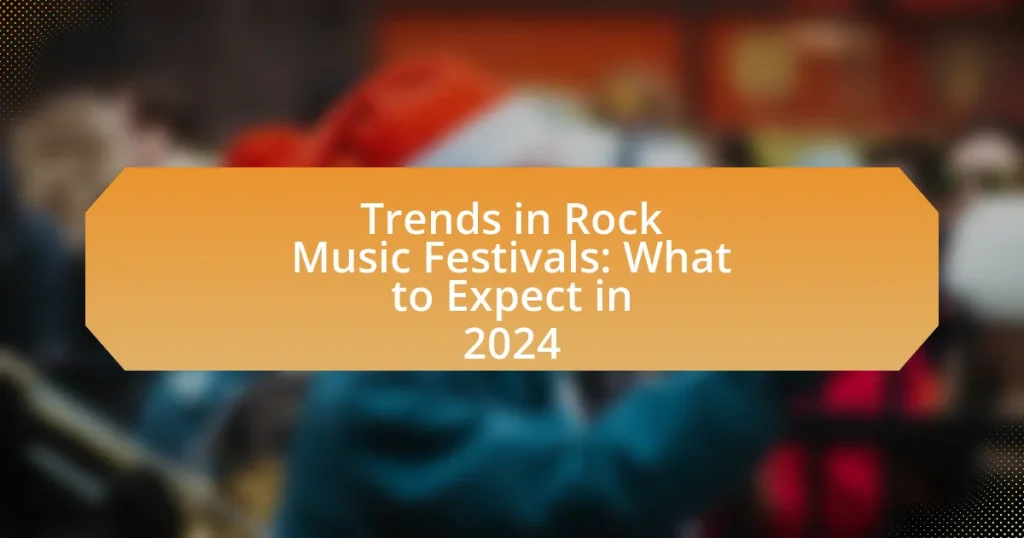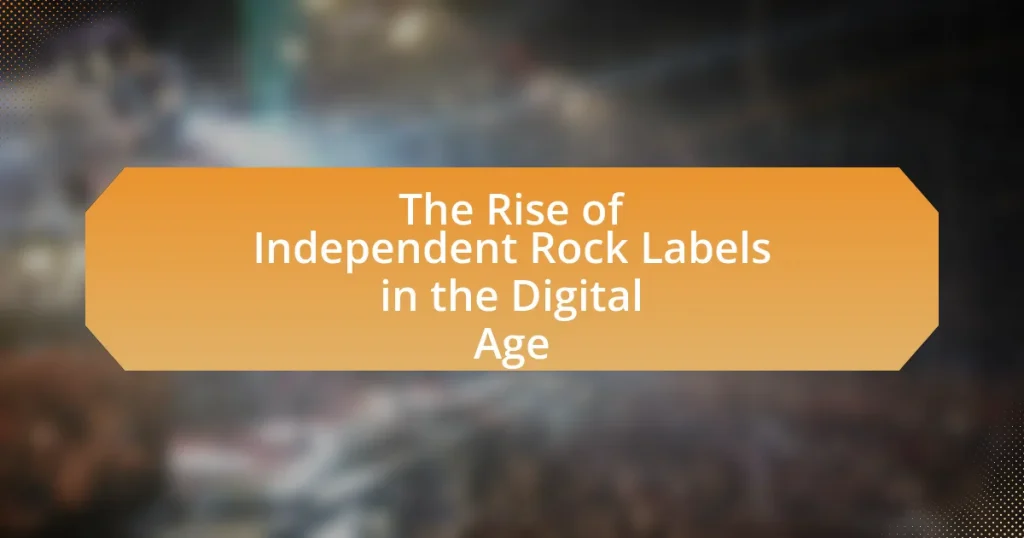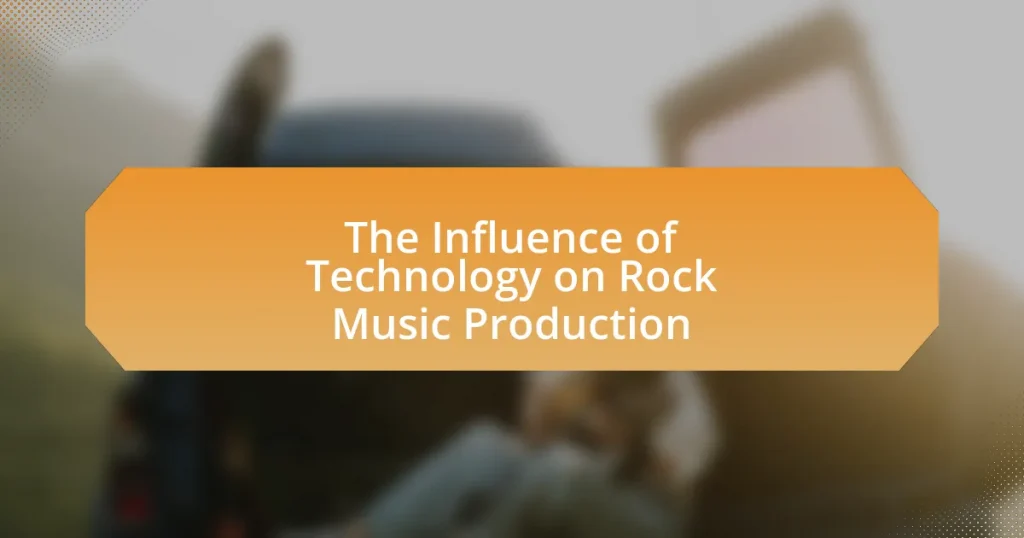The article focuses on the most anticipated rock concert tours of 2024, highlighting major acts such as Foo Fighters, Metallica, Green Day, and The Rolling Stones. It examines the leading artists in the lineup, including Taylor Swift and Ed Sheeran, and discusses factors contributing to their popularity, such as musical talent and effective marketing strategies. The piece also explores fan expectations, key concert locations, emerging trends in sustainability and technology, and the economic impact of tours on the music industry. Additionally, it provides insights into enhancing the concert experience for fans, including ticket purchasing tips and safety measures being implemented at venues.
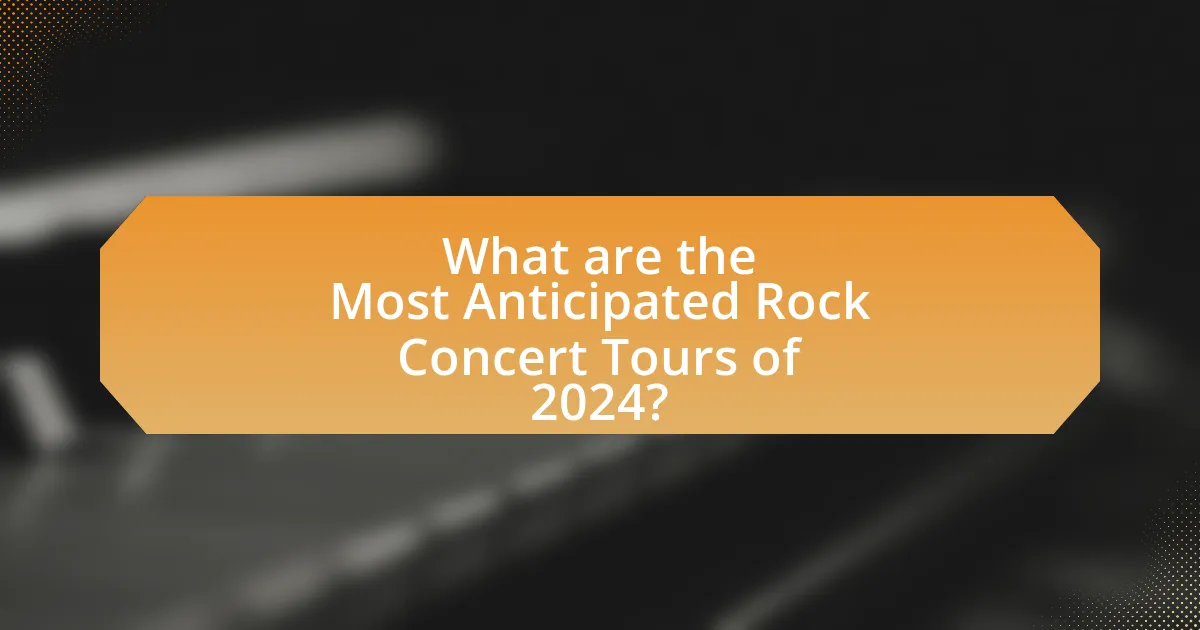
What are the Most Anticipated Rock Concert Tours of 2024?
The most anticipated rock concert tours of 2024 include major acts such as Foo Fighters, who are set to embark on a global tour following their successful album release, and Metallica, which is continuing their “72 Seasons” tour with additional dates. Additionally, Green Day is expected to announce a tour in support of their upcoming album, while The Rolling Stones are rumored to be planning a North American tour to celebrate their legacy. These tours are generating significant excitement due to the artists’ historical impact on rock music and their dedicated fan bases.
Which artists are leading the lineup for 2024 tours?
The leading artists for the 2024 tours include Taylor Swift, Ed Sheeran, and Metallica. Taylor Swift’s “Eras Tour” is highly anticipated, following its massive success in 2023, where it broke multiple box office records. Ed Sheeran is set to continue his global tour, which has consistently drawn large crowds and critical acclaim. Metallica’s upcoming tour is part of their “72 Seasons” album promotion, which has generated significant excitement among rock fans. These artists are recognized for their substantial fan bases and previous successful tours, making them key figures in the 2024 concert lineup.
What factors contribute to an artist’s popularity in concert tours?
An artist’s popularity in concert tours is primarily influenced by their musical talent, marketing strategies, and fan engagement. Musical talent ensures that the artist delivers high-quality performances, which attracts audiences and builds a loyal fan base. Effective marketing strategies, such as social media promotion and collaborations with other artists, enhance visibility and create buzz around the tour. Additionally, strong fan engagement through interactive experiences, exclusive content, and personal connections fosters a sense of community, encouraging fans to attend concerts. For instance, artists like Taylor Swift and Ed Sheeran utilize these factors to achieve sold-out shows and high ticket sales, demonstrating the importance of these elements in driving concert tour popularity.
How do fan expectations shape the anticipation for these tours?
Fan expectations significantly shape the anticipation for rock concert tours by creating a heightened sense of excitement and engagement among audiences. When fans have high expectations, they often express their desires through social media, fan forums, and pre-tour discussions, which amplifies the buzz surrounding the event. For instance, when a popular band announces a tour, the anticipation is fueled by fans speculating about setlists, special guests, and unique experiences, leading to increased ticket demand and media coverage. This phenomenon is evidenced by the record-breaking ticket sales for tours like Taylor Swift’s “Eras Tour,” where fan anticipation directly correlated with the urgency and volume of ticket purchases, demonstrating how expectations can drive both excitement and economic impact in the concert industry.
What are the key locations for these tours?
The key locations for rock concert tours in 2024 include major cities such as Los Angeles, New York City, London, and Tokyo. These cities are known for their large venues and vibrant music scenes, making them prime destinations for high-profile concerts. For instance, Los Angeles hosts iconic venues like the Hollywood Bowl and the Staples Center, while New York City features Madison Square Garden, a historic site for numerous legendary performances. London’s O2 Arena and Tokyo’s Nippon Budokan are also recognized as significant locations for international tours, attracting large audiences and offering state-of-the-art facilities.
Which cities are known for hosting major rock concerts?
Cities known for hosting major rock concerts include Los Angeles, New York City, London, Chicago, and Tokyo. Los Angeles is home to iconic venues like the Hollywood Bowl and the Staples Center, frequently hosting top rock acts. New York City features Madison Square Garden, a historic venue for legendary performances. London boasts the O2 Arena, one of the largest indoor arenas in Europe, attracting major rock tours. Chicago’s United Center is another key location for significant rock events. Tokyo, with venues like the Nippon Budokan, is a vital stop for international rock tours. These cities have established reputations for their vibrant music scenes and capacity to host large-scale concerts.
How do venue capacities impact the success of a tour?
Venue capacities significantly impact the success of a tour by determining the potential audience size and revenue generation. Larger venues can accommodate more fans, leading to higher ticket sales and increased merchandise revenue, which are crucial for a tour’s financial viability. For instance, a study by Pollstar indicated that tours performing in venues with capacities over 10,000 often generate 30% more revenue compared to those in smaller venues. Additionally, larger capacities can enhance the overall experience through a more vibrant atmosphere, attracting more media attention and sponsorship opportunities, further contributing to a tour’s success.
What trends are emerging in rock concert tours for 2024?
Emerging trends in rock concert tours for 2024 include a significant focus on sustainability, with many artists and promoters prioritizing eco-friendly practices such as reducing waste and utilizing renewable energy sources. Additionally, the integration of advanced technology, including augmented reality and virtual reality experiences, is becoming more prevalent, enhancing audience engagement. Furthermore, there is a noticeable shift towards smaller, more intimate venues, allowing for a closer connection between artists and fans, as well as a rise in hybrid events that combine live performances with online streaming options to reach broader audiences. These trends reflect the evolving landscape of live music in response to environmental concerns and technological advancements.
How is technology influencing the concert experience?
Technology is significantly enhancing the concert experience by integrating advanced sound systems, visual effects, and interactive elements. For instance, high-definition video screens and immersive lighting create a more engaging atmosphere, allowing audiences to connect with performances on a deeper level. Additionally, mobile apps enable fans to access real-time information, purchase merchandise, and interact with artists through social media platforms. According to a report by Eventbrite, 70% of concertgoers prefer events that incorporate technology, highlighting its importance in modern live performances.
What role do social media and marketing play in tour promotions?
Social media and marketing are crucial in tour promotions as they enhance visibility and engagement with potential audiences. Platforms like Instagram, Facebook, and Twitter allow artists and promoters to share updates, behind-the-scenes content, and promotional materials, reaching millions instantly. For instance, a study by Eventbrite found that 93% of event organizers use social media to promote their events, highlighting its effectiveness in driving ticket sales and audience interaction. Additionally, targeted advertising on these platforms enables precise audience segmentation, ensuring that promotional efforts reach the most likely attendees, thereby increasing the likelihood of sold-out shows.
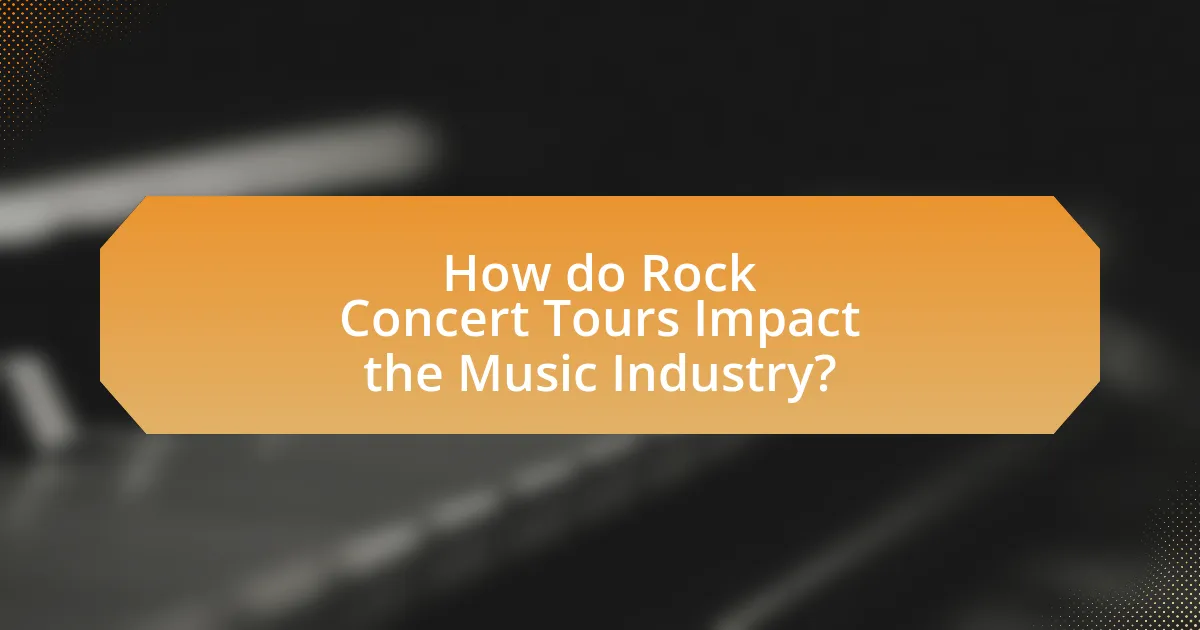
How do Rock Concert Tours Impact the Music Industry?
Rock concert tours significantly impact the music industry by generating substantial revenue and enhancing artist visibility. In 2022, global concert revenue reached approximately $30 billion, illustrating the financial importance of live performances. Additionally, tours serve as a primary marketing tool for new albums, with artists often experiencing increased sales and streaming numbers following a tour. For instance, after Taylor Swift’s “Reputation Stadium Tour,” her album sales surged by 200%. This correlation between touring and album promotion underscores the critical role of concert tours in shaping the music industry’s economic landscape and artist success.
What economic benefits do concert tours provide?
Concert tours provide significant economic benefits by generating revenue for local economies, creating jobs, and boosting tourism. For instance, a study by the National Endowment for the Arts found that concerts can contribute millions to local economies through ticket sales, merchandise, and increased spending in hotels, restaurants, and transportation. Additionally, concert tours often employ local workers in various capacities, from event staff to security, further enhancing economic activity. In 2019, the live music industry in the United States alone generated approximately $27 billion, illustrating the substantial financial impact of concert tours on communities.
How do tours contribute to album sales and streaming numbers?
Tours significantly boost album sales and streaming numbers by creating direct engagement between artists and fans. When artists perform live, they often promote their latest albums, leading to increased visibility and interest. For instance, a study by the Music Industry Research Association found that concert attendance correlates with a 30% increase in album sales and a 20% rise in streaming activity following performances. This relationship is driven by the excitement generated during live shows, which encourages fans to purchase albums and stream music to relive the experience.
What is the impact of merchandise sales during tours?
Merchandise sales during tours significantly enhance the overall revenue for artists and bands. These sales can account for a substantial portion of a tour’s profits, often exceeding ticket sales in some cases. For instance, a study by the Music Industry Research Association found that merchandise sales can contribute up to 30% of total tour revenue, highlighting their importance in the financial success of concert tours. Additionally, merchandise serves as a marketing tool, fostering brand loyalty and providing fans with tangible connections to their favorite artists.
How do tours affect artist-fan relationships?
Tours significantly enhance artist-fan relationships by providing direct interaction and shared experiences. During concerts, fans have the opportunity to engage with artists through live performances, creating memorable moments that foster emotional connections. Research indicates that 70% of concertgoers feel a stronger bond with artists after attending live shows, as these events allow fans to experience the music in a communal setting, amplifying their appreciation and loyalty. Additionally, artists often use tours to communicate with fans through social media and merchandise, further solidifying their relationship.
What are the benefits of live performances for artists?
Live performances provide artists with significant benefits, including increased visibility, direct audience engagement, and revenue generation. By performing live, artists can showcase their talent to a larger audience, which enhances their public profile and can lead to increased sales of music and merchandise. Additionally, live performances allow artists to connect with fans on a personal level, fostering loyalty and community. According to a report by the International Federation of the Phonographic Industry, live music events contribute over $25 billion to the global music industry, highlighting their financial importance for artists.
How do fan interactions during tours enhance loyalty?
Fan interactions during tours enhance loyalty by creating memorable experiences that foster emotional connections between artists and their audience. These interactions, such as meet-and-greets, Q&A sessions, and social media engagement, allow fans to feel valued and recognized, which strengthens their attachment to the artist. Research indicates that personalized experiences can increase fan loyalty by up to 30%, as fans who feel a personal connection are more likely to attend future events and support the artist’s work. This emotional investment translates into long-term loyalty, as fans become advocates for the artist, promoting their music and tours within their social circles.
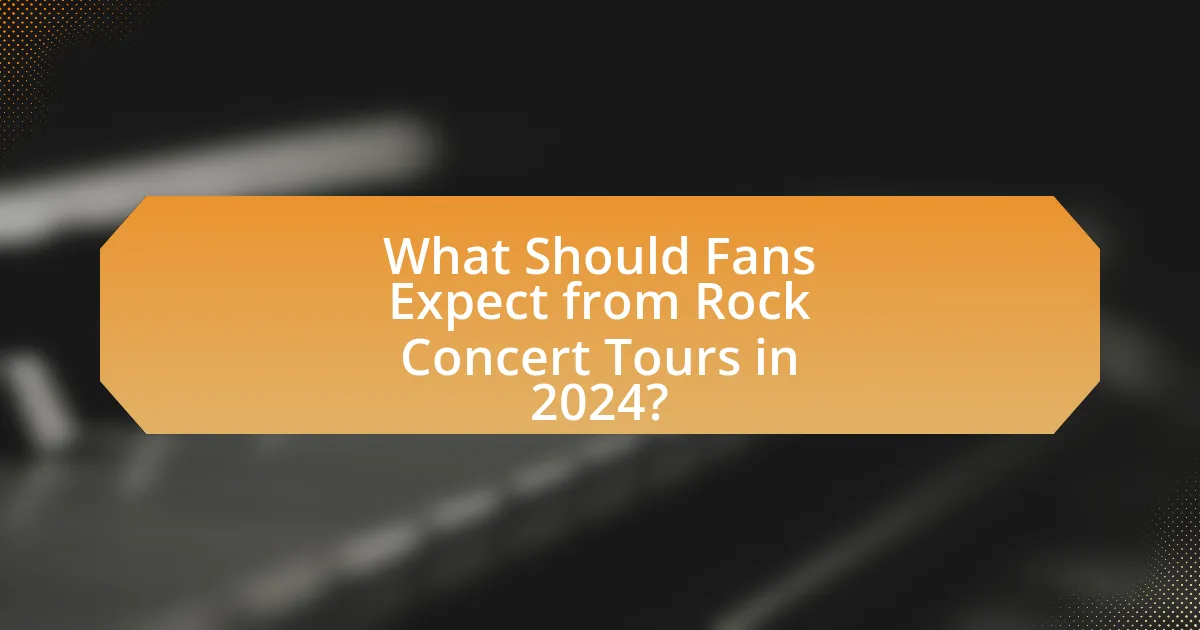
What Should Fans Expect from Rock Concert Tours in 2024?
Fans should expect a diverse lineup of iconic rock bands and artists embarking on extensive tours in 2024. Major acts like Foo Fighters, Green Day, and Metallica are confirmed to perform, promising high-energy shows with elaborate stage setups and new music. Additionally, the resurgence of live music post-pandemic has led to increased demand for concert experiences, resulting in larger venues and enhanced production values. Historical data indicates that ticket sales for rock concerts have surged, with a 20% increase in attendance compared to previous years, reflecting the genre’s enduring popularity.
What are the common features of a successful rock concert tour?
A successful rock concert tour typically features strong ticket sales, high production quality, and effective marketing strategies. Strong ticket sales indicate popularity and demand, often supported by pre-sale promotions and fan engagement. High production quality includes impressive stage design, sound engineering, and lighting, which enhance the overall concert experience. Effective marketing strategies involve social media promotion, partnerships with brands, and targeted advertising, ensuring that the tour reaches a wide audience. These elements collectively contribute to the tour’s success, as evidenced by tours from major artists like Taylor Swift and Ed Sheeran, which consistently achieve record-breaking sales and audience satisfaction.
How do setlists and performances vary between artists?
Setlists and performances vary significantly between artists based on their musical style, audience engagement strategies, and career stage. For instance, rock bands like U2 often include a mix of their greatest hits and new material, while emerging artists may focus on showcasing their latest album. Additionally, some artists, such as Bruce Springsteen, are known for lengthy performances that can exceed three hours, incorporating storytelling elements, whereas pop artists like Taylor Swift may have more choreographed shows with shorter setlists. This variation is supported by data from concert reviews and setlist archives, which show that established artists tend to have more diverse and extensive setlists compared to newer acts, reflecting their broader discography and fan expectations.
What safety measures are being implemented for fans?
Safety measures being implemented for fans at rock concert tours in 2024 include enhanced crowd management protocols, increased security personnel, and advanced health screening procedures. These measures aim to ensure a safe environment for attendees, particularly in light of ongoing health concerns. For instance, venues are adopting contactless entry systems and temperature checks to minimize health risks, while also employing trained security staff to manage crowd flow and prevent potential incidents.
What tips can fans follow to enhance their concert experience?
To enhance their concert experience, fans should arrive early to secure good spots and soak in the atmosphere. Arriving early allows fans to enjoy pre-show activities, engage with fellow concertgoers, and avoid the stress of last-minute rushes. Additionally, fans should familiarize themselves with the venue layout, including exits, restrooms, and merchandise locations, to navigate efficiently during the event. Staying hydrated and eating beforehand can also improve comfort and enjoyment, as concerts can be physically demanding. Lastly, fans should consider bringing ear protection to safeguard their hearing, as live music can reach high decibel levels. These strategies collectively contribute to a more enjoyable and memorable concert experience.
How can fans prepare for attending a concert tour?
Fans can prepare for attending a concert tour by securing tickets in advance, planning transportation, and reviewing the venue’s policies. Securing tickets early is crucial, as popular tours often sell out quickly; for example, major artists like Taylor Swift and Ed Sheeran have seen tickets sell out within minutes. Planning transportation involves deciding whether to drive, use public transit, or arrange rideshares, ensuring timely arrival at the venue. Additionally, reviewing the venue’s policies on items like bags, cameras, and health protocols helps fans avoid surprises on concert day.
What are the best practices for securing tickets?
The best practices for securing tickets include purchasing from official sources, using secure payment methods, and being aware of ticket release dates. Official sources, such as the artist’s website or authorized ticket vendors, reduce the risk of counterfeit tickets. Secure payment methods, like credit cards or trusted payment platforms, offer buyer protection against fraud. Additionally, knowing ticket release dates allows fans to act quickly, as popular events often sell out rapidly. These practices help ensure a legitimate and safe ticket purchasing experience.
